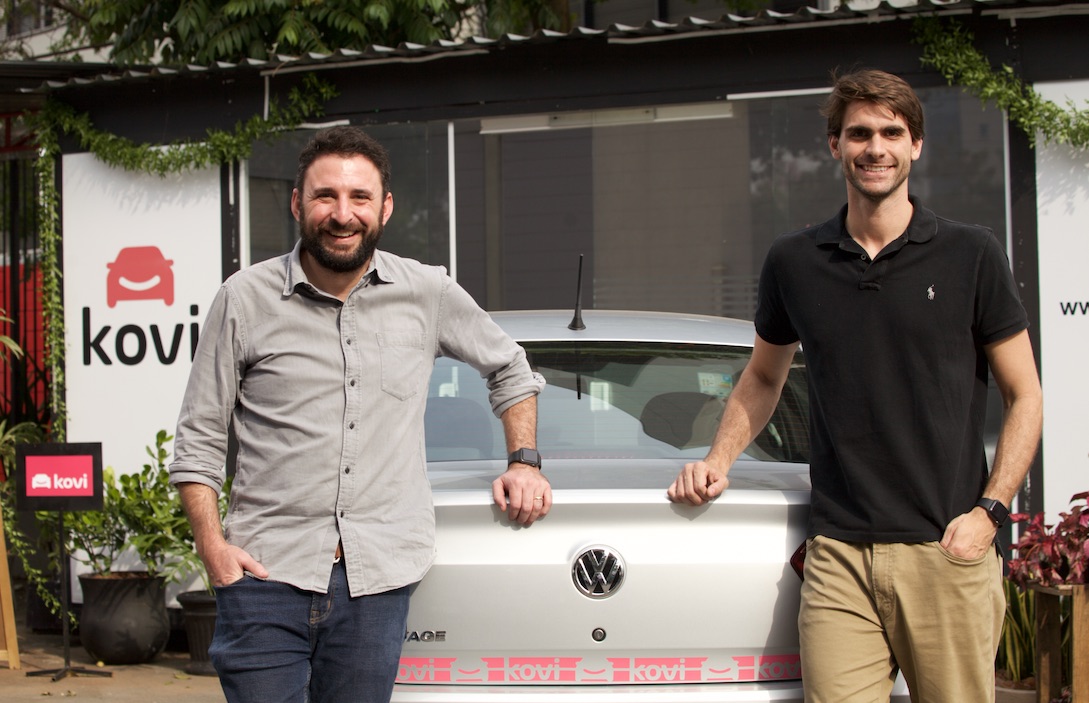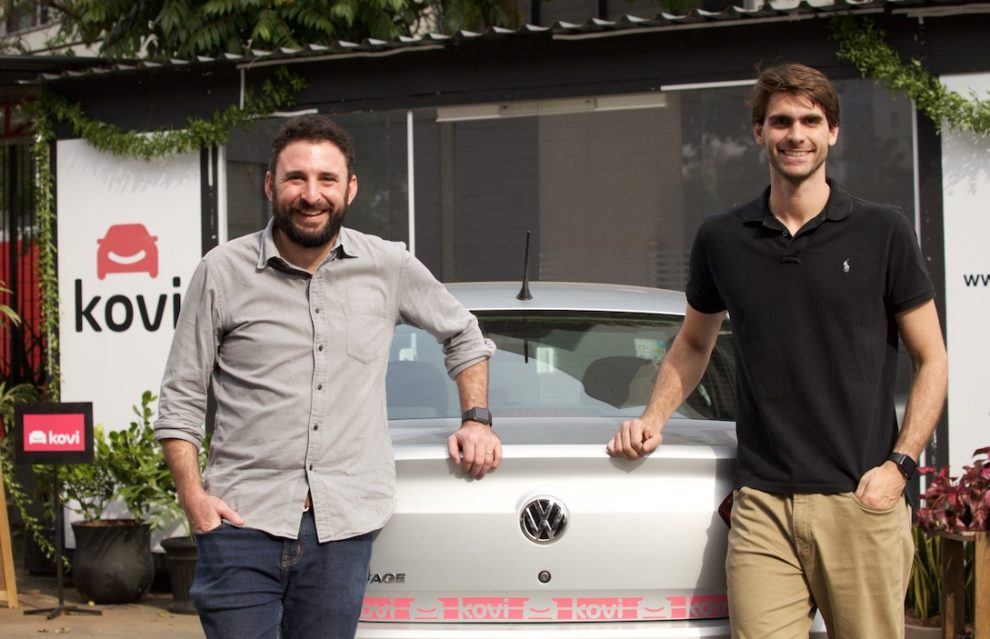Kovi, a fast-growing 17-month-old Brazilian mobility startup, has raised a $30 million Series A led by Global Founders Capital.
Subscribe to the Crunchbase Daily
New investor Quona Capital and existing investors Monashees, Maya Capital, Accel partner Kevin Efrusy, Y Combinator, Broadhaven Ventures, Tinder founder Justin Mateen and ONEVC also participated in the financing, which brings Kovi’s total raised since its inception to $40.6 million.
Founded in 2018 by two former 99 (Brazil’s first tech unicorn) executives, São Paulo-based Kovi rents vehicles to on-demand drivers who work for ride-hailing companies such as Uber, Didi and Lyft. It operates under the premise that more people in Latin America would work for these companies if they could afford to operate the necessary vehicle. Less than half the population in Brazil own a car. Also, cars are significantly more expensive in countries like Brazil than in the U.S. and the difference is even greater when it comes to the average income of the population. Kovi gives drivers who don’t necessarily want, or cannot afford, to own a vehicle “quick access to quality cars” at what it says is “a fair price”
Growth
Using machine learning, Kovi says it’s able to monitor vehicles and drivers in real time, “ensuring safety and performance in the use of cars, as well as driver welfare.”
Also, via its model, drivers don’t have to worry about damage or theft to vehicles since they don’t have “to buy and leave expensive shared cars parked on the street,” the company says. (High car crime rates are prevalent across parts of Latin America).
Kovi currently has about 110 employees (up from about 20 a year ago) and more than 3,000 active cars in its fleet. It currently operates in São Paulo, Porto Alegre and Mexico City, and recently opened an office in Mexico.
Adhemar Milani Neto, Kovi’s CEO and co-founder, told me that the startup has been seeing about 68 percent growth monthly. The company plans to use its new capital to do some hiring, increase its fleet and expand into other cities and countries. It also plans to invest in developing technology aimed at improving “the driver experience while increasing fleet security,” said João Costa, Kovi’s CTO and co-founder.
In a short amount of time, Kovi has established partnerships with a number of automakers and rental companies.
Neto predicts the company will have 5,000 drivers by year’s end.
Investors Weigh In
To Neto, having an investor such as Global Founders Capital (which has previously backed the likes of LinkedIn and Facebook) validates its business model.
I hopped on the phone with Fabricio Pettena, who heads up GFC’s Latin American office in São Paulo, and he noted that this isn’t the first time his firm has put money in Kovi.
Kovi, he said, addresses the problem that there are “basically thousands of gig economy drivers in Latin America and a majority of them have trouble owning and maintaining the asset they need to work.”
“So, Kovi’s offering for them is very compelling,” Pettena told me.
Further, he believes the opportunity is a large one. Between Mexico, Brazil and other Latin American countries, there are more than 1 million people for whom driving ride-hailing vehicles is their primary earning method.
“There’s a huge market on the demand side, with companies needing drivers,” Pettena added. “And on the supply side, there’s literally a waiting line of people wanting cars to drive. Kovi is able to provide that car supply.”
Global Founders Capital established its Latin American presence by opening an office in Brazil in 2016, according to Pettena. It now has 30 companies from the region in its portfolio, most of which are “early stage or under the radar,” he said.
“We try to become lifecycle investors in the companies we really like,” Pettena said. “With Kovi, we see there is a very clear, concrete business to scale.”
Pedro Sorrentino, founder of ONEVC (which we profiled in this piece last month), said his firm looks to partner with category-defining companies in large markets.
“Kovi is exactly that,” he said.
Noting the above points about cost being a barrier, Sorrentino pointed out that typically, the community of ride-hailing drivers don’t have access to credit or “essential services like health insurance.”
“The lack of access to essential services at-large creates an enormous opportunity since you have a significant pool of people that want to be economically active, but don’t have the tools (the car) to start the job,” he told me.
Latin America and other emerging markets are prime opportunities for companies like Kovi, he said. In fact, the second-biggest Uber market is Brazil in which 17 million users were using the app in March 2018.
Also, ONEVC is drawn to the fact that “in a post-WeWork world,” Kovi “operates an asset-light business model that scales.”
It leases the cars and doesn’t have to sell them back to the market, “allowing the company to focus on fleet management risk and prime customer experience for the drivers.”
“Kovi is profitable on every single car, continually improving gross margins given the scale of the business,” Sorrentino said. “The team has a solid background in the market and since we first partnered with the Kovi team, the company has grown the size of its fleet by more than 100 times. Early days, but very promising.”
In April, we did a deep dive look at how Latin America has “arrived” among global VCs. Brazil has been the largest recipient of venture funding in an increasingly hot investment climate in Latin America. Earlier this year, we reported that venture funding in the region’s largest country exploded in 2018 to $1.3 billion, representing nearly two-thirds of all venture money raised in Latin America as a whole last year, according to LAVCA, the Association for Private Capital Investment in Latin America. That’s 52 percent more than the $859 million invested Brazil in 2017, and a staggering 369 percent increase from the $279 million raised in 2016, as you can see in the chart below:

Blog Roll Illustration: Dom Guzman

Stay up to date with recent funding rounds, acquisitions, and more with the Crunchbase Daily.




![Illustration of remote meet on cellphone, unicorn chess piece and money. [Dom Guzman]](https://news.crunchbase.com/wp-content/uploads/business-strategy-470x352.jpg)
![Illustration of conversation bubbles. [Dom Guzman]](https://news.crunchbase.com/wp-content/uploads/Talk-470x352.jpg)





![Money - Illustration of a giant piggybank with a woman looking at it. [Dom Guzman]](https://news.crunchbase.com/wp-content/uploads/Big_Piggy_Bank-300x168.jpg)
67.1K Followers